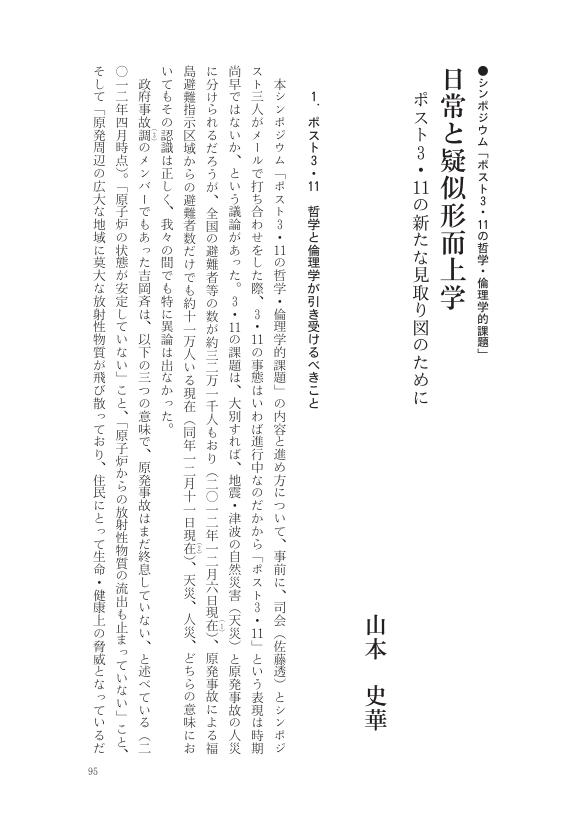- 著者
- 河相 安彦 矢崎 貴啓 松丸 悠一 先崎 孝三郎 浅井 秀明 今道 康夫 伊藤 允人 杉村 華織 竹尾 藍 朱 一慶 伊澤 武志 大野 洋介 山本 史朗 小平 真倫亜 宗 邦雄 島 由樹 林 幸男 桑原 克久 小林 喜平
- 出版者
- Japan Prosthodontic Society
- 雑誌
- 日本補綴歯科學會雜誌 = The journal of the Japan Prosthodontic Society (ISSN:03895386)
- 巻号頁・発行日
- vol.51, no.3, pp.572-581, 2007-07-10
- 被引用文献数
- 3 7
目的: 本研究の目的は総義歯学の授業で講義型学習 (以下LBL) と問題解決型学習 (以下PBL) 双方を経験した学生の自己学習および臨床推理能力に関する教育効果と授業・教員に対する評価の両教育形式間での比較検討である.<BR>方法: 総義歯学の授業を平成15年度入学の学生に, 平成17年度3年次前期にLBL, 平成18年度4年次前期にPBLにて行った. PBLは5回にわたり, 毎回1症例についてグループディスカッションを行い, グループによるまとめを2回, 個人レポートを2回および全体発表を1回という予定で進行した. 全体発表終了後, 教育効果および授業・教員に関する27項目のアンケートを行った.因子分析により質問項目の類型を行い, 各質問項目についてLBLおよびPBLの比較を行った (Paired-t).<BR>結果: 因子分析より質問項目は4因子に類型された. LBLとPBLとの間で「学習態度」について7項目中4項目, 「臨床推理能力」について全項目, 「授業内容」について7項目中5項目, 「教員評価・そのほか」について6項目中2項目, 合計27項目中18項目 (66.6%) でPBLが有意に高い値を示した.<BR>結論: PBLはLBLに比べ自己学習および臨床推理能力の教育効果の向上に極めて有効で, 授業に関する評価も有意に高かった. 一方, 同様の授業を受けることに学生は後向きで, 消極性解消法の検討が必要であると示唆された.
1 0 0 0 OA 日常と疑似形而上学 ポスト3・11の新たな見取り図のために
- 著者
- 山本 史華
- 出版者
- 東北哲学会
- 雑誌
- 東北哲学会年報 (ISSN:09139354)
- 巻号頁・発行日
- vol.29, pp.95-110, 2013 (Released:2022-08-02)
1 0 0 0 OA 現代の倫理的なイラ立ちについて 共生と寛容の手前で
- 著者
- 山本 史華
- 出版者
- 東北哲学会
- 雑誌
- 東北哲学会年報 (ISSN:09139354)
- 巻号頁・発行日
- vol.26, pp.29-44, 2010 (Released:2022-07-29)
- 著者
- 山本 史華
- 出版者
- 東北哲学会
- 雑誌
- 東北哲学会年報 (ISSN:09139354)
- 巻号頁・発行日
- vol.14, pp.64-65, 1998-04-30 (Released:2018-02-28)
1 0 0 0 OA 臨床研究におけるアフターケア倫理 : その理念の提示
- 著者
- 山本 史華
- 出版者
- 日本医学哲学・倫理学会
- 雑誌
- 医学哲学 医学倫理 (ISSN:02896427)
- 巻号頁・発行日
- vol.25, pp.31-39, 2007-10-18 (Released:2018-02-01)
Few of the current guidelines on clinical research mention ex post issues. For example, the Declaration of Helsinki includes as such an issue only its 30th Article and note. As for concrete ethical requirements, that is, Informed Consent, Assessment of Risks and Benefits and Selection of Subjects, the chief aim covers all aspects of applying the regulations to the preconditions. Emphasis was for a long time focused on how ethical principles regulate ex ante issues. In recent years, based on reflection on this situation, the need for ex post ethics has gradually become clear. Patricia A. King notes, in Belmont Revisited, that fairness requires specific compensatory justice and procedural justice, both of which were ignored in the Belmont Report. This paper aims to construct the idea of ex post ethics, which we call aftercare ethics, through examination of the principles of biomedical ethics. Chapter 1 confirms the fact that compensation and free medical treatment for accidental injury or damage are extremely rare in guidelines for clinical research. In Chapter 2, we address the problems of the emotions of the injured and the compensation. The reason why they were absent from clinical research is examined. In Chapter 3, it is shown that if we reinterpret the principles of respect for persons and of justice, we can see that the ethical necessity referred to in the preceding chapter can be derived from the said principles. Finally, in Chapter 4, we present the basic idea of aftercare ethics.
1 0 0 0 薬機法改正における薬局への期待 -令和の時代と、その先へ-
- 著者
- 山本 史
- 雑誌
- 第53回日本薬剤師会学術大会
- 巻号頁・発行日
- 2020-09-03


